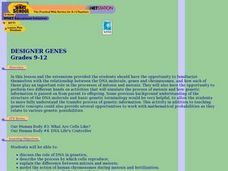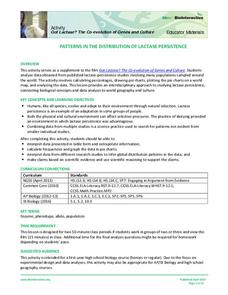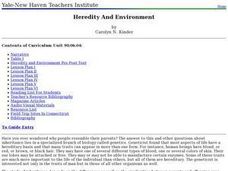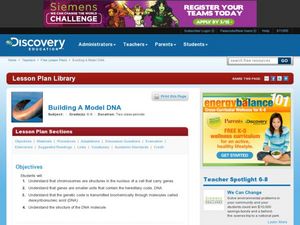Curated OER
Heredity, Genetics, Traits
Eighth graders study how an embryo develops into a fetus by undergoing many physical changes which they observe on a poster. They examine the metamorphosis of fruit flies as they develop through a series of changes. They record the...
Curated OER
Designer Genes
Students view a video on DNA. They discuss mitosis, meiosis and fertilization. They use strips of paper to simulate fertilization and analyze the genotype and phenotype of the combined chromosomes.
Curated OER
Artificial selection
Students brainstorm a list of improvements they might make to a picture of a skinny cow to improve its milk yield. They draw ideas on the board and compare these pictures with the original and ask the students which cow they would use...
Curated OER
Dihybrid Cross Punnett Squares
In this dihybrid cross learning exercise, students complete two punnett squares for the cross of two traits. They determine the genotypes, phenotypes and phenotypic ratios of the offspring.
Curated OER
Genome: The Secret of How Life Works
What do you have in common with a fruit fly? About 60 percent of your DNA. The resource, divided into two units, is intended for grades four to eight and another for high schoolers. Both units include eight lessons covering the genome as...
Personal Genetics Education Project
How Does Ancestry Testing Work? Exploring Admixture Testing
Find out the science behind ancestry testing! Investigators watch a video exploring how ancestry works before participating in a hands-on group activity. Scholars role play scientists while learning about testing protocols and test...
BBSRC
Discovering DNA: The Recipe for Life
A pinch of adenine, a dash of thymine and ta-da, you have life! Well, it's not quite that simple, but through this series of activities and experiments young scientists learn about the structure of DNA and how it contains the recipe for...
Howard Hughes Medical Institute
Patterns in the Distribution of Lactase Persistence
We all drink milk as babies, so why can't we all drink it as adults? Examine the trend in lactase production on the world-wide scale as science scholars analyze and interpret data. Groups create pie charts from the data, place them on a...
Curated OER
From Genomes of Species
Students investigate genomic research being done and its potential for understanding, treating, and possibly curing human genetic conditions. The potential of proteomic research as a companion to the work being done with genomics is...
Curated OER
Gene Puzzles
Students come to understand that in sexually reproducing organisms, such as humans, typically half of the genes come from each parent.
Students examine a fictional pedigree and determine which gene is responsible for a given trait. The...
Curated OER
The Empirical Challenges of Racial Classification
This lesson plan will help students examine their preconceptions and assumptions about racial categories and understand the impossibility of constructing a consistent system of human racial classification.
Curated OER
Heredity And Environment
Students complete a pre-test on the relationship between heredity and the environment. As a class, they write down descriptions of themselves and identify which traits can be changed and not changed. In groups, they determine which genes...
Curated OER
They're more evolved that way
Students explore the notion of local evolution, or genetic selectivity among different continent-based human populations. They consider specific examples of local evolution, such as lactose tolerance, skin color, and cognitive capacity,...
Curated OER
Here's Looking at You
Students assess some common inherited traits which are easily observable and note their phenotype for the trait. Students compare their phenotypes to those of their parents and attempt to describe the pattern and manor of inheritance.
Curated OER
Building a Model DNA
Students explain the function of DNA in the body. In this biology lesson, students build a DNA model using simple materials. They demonstrate how bases pair up in the helix.
Curated OER
Nature And Nurture
Students develop an understanding of the role both nature and nurture play in determining an individual's traits. Using a website, students answer questions about nature and nurture in order to solve the riddle, What do you call a smart...
Curated OER
Population Study and Applications Using PTC Paper
Students study human population traits. In this science lesson plan, students gain an understanding of the terms dominant, recessive, haploid (monoploid), diploid, genotype, phenotype, scientific sampling, and scientific modeling as they...
Curated OER
Sex-Linked Genes and Disorders
In this genes worksheet, students determine how the gender of a baby is produced plus explore sex-linked disorders such as hemophilia. This worksheet has 20 fill in the blank and 8 short answer questions.
Curated OER
Adaptation Worksheet
Adaptation or acclimation? Young ecologists determine which is being exemplified in twenty questions. When teaching about adaptations, make sure to talk about acclimation, a short-term learned response to a change in the surroundings....
Howard Hughes Medical Institute
The Making of the Fittest: Got Lactase? The Co-evolution of Genes and Culture
Got milk? Only two cultures have had it long enough to develop the tolerance of lactose as an adult. Learn how the responsible genes evolved along with the cultures that have been consuming milk. This rich film is supplied with a few...
Agriculture in the Classroom
A Rafter of Turkeys
How did that turkey get from the early Aztec culture to your table? Learn about the history of wild and domesticated turkeys in North America, as well as their inclusion in Thanksgiving traditions, with a two-part agricultural science...
WK Kellogg Biological Station
Sounds of Selection
Do you want a creative and fun way to teach about natural selection? Hop to it by turning your middle school princes and princesses into frogs trying to catch as many bugs as possible in a Hungry Hungry Hippos style game. For high...
Curated OER
Born of Blood: Inheritance of Blood Types
Students examine inheritance of blood types. In the chromosome lesson, students create a model of chromosome and predict the blood type of offspring.
Curated OER
Where Are the Dinosaurs?
Pupils explore the concept of extinction by studying dinosaurs. In this dinosaur lesson, students distinguish between extinct creatures and those that still exist.

























